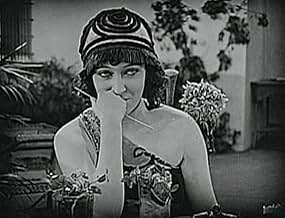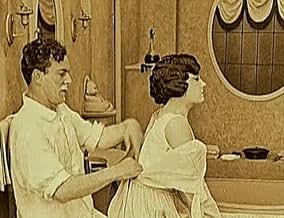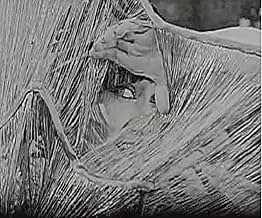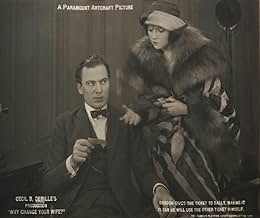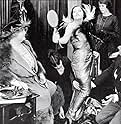Robert et Beth sont mariés mais partagent peu de choses. Il rencontre Sally dans un cabaret et ils divorcent rapidement. Robert se lasse vite de la superficielle Sally. Le couple originel to... Tout lireRobert et Beth sont mariés mais partagent peu de choses. Il rencontre Sally dans un cabaret et ils divorcent rapidement. Robert se lasse vite de la superficielle Sally. Le couple originel tombe à nouveau amoureux dans une station balnéaireRobert et Beth sont mariés mais partagent peu de choses. Il rencontre Sally dans un cabaret et ils divorcent rapidement. Robert se lasse vite de la superficielle Sally. Le couple originel tombe à nouveau amoureux dans une station balnéaire
- Réalisation
- Scénario
- Casting principal
- Doctor
- (as Clarence Geldart)
- Naval Officer at Hotel
- (non crédité)
- Party Guest Dozing
- (non crédité)
- Girl in Bathing Suit
- (non crédité)
- Sally's Maid
- (non crédité)
Avis à la une
The second half of this double-bill features one of the very few surviving films of Cecil's older brother William de Mille (he kept the original family spelling) who started his career as a successful Broadway playwright. One of his plays THE WARRENS OF VIRGINIA from 1907 featured Cecil as an actor and a 15 year old performer named Mary Pickford. MISS LULU BETT was based on the stage version of a then famous book which examined the lonely life of a maiden aunt and her attempts to break free from the stifling enviornment of her sister's family. This is a silent example of what was then called a "woman's picture" which we know today as a "chick flick". It concentrates on plot and slow development of character rather than fast pacing and lots of action. In style it is very similar to the films of Lois Weber especially THE BLOT (also reviewed by me) which came out the same year, 1921, just one year after women received the right to vote. The ensemble performances by the family are all solid with Lois Wilson a standout as the title character. Wilson was a big star for Paramount in the early 1920's later appearing in 1923's THE COVERED WAGON. Although LULU is dated by today's standards, it's fascinating to see just how dated and just how far single women have come since 1921. While I enjoyed WIFE, I have to give the nod here to brother William as I got more out of his film than I expected. Hopefully more of them will become available for us to see...For more reviews visit The Capsule Critic.
This is a great romp, getting better with every scene. It is not good to women, though, making them out to be selfish and catty. It also makes it seem that a woman's role is to be beautiful for her man, and if she isn't, he practically has the right to leave her. I mean, come on now!
The leads (three of them) are all first rate. The man is a charmer, really convincing and natural, Thomas Meighan. His wife (at first) is Gloria Swanson, a silent screen staple (especially for director Cecil B. de Mille who directed six straight films with Swanson, including the parallel, Don't Change Your Husband (1919). But the third other woman is Swanson's match, Bebe Daniels, and if she isn't as famous, it's only because time is fickle.
Because the three are so well balanced, both in ability and in the way they are given time together (in all three possible combinations, plus all three of them together), the film really builds momentum well. The modernity of flipping wives was probably part of the racy appeal, and it might seem a little staid by our standards, where there is (sometimes) less gravity to a marriage.
Music is key, which might seem odd for a silent film, but by showing us the 78 records being put on, the audience knows what the soundtrack would be. (The actually sound tacked on to my DVD version of this film is a brutal melange of found orchestral pieces that cut in and out, hither and tither.) For those interested in the actual piece called Hindustan that is key in three scenes (and key to the changing sentiments of the women) go to www.archive.org/details/JosephC.SmithsOrchestra-01-07 and you can actually click on piece to hear it (a lively pre-jazz dance type number).
So is this a pertinent film? In a way, it is. It's basic theme of paying attention to what your mate needs, and appreciating their attentions, is pretty timeless. But in other ways the film is sadly, painfully retrograde, and it isn't just because it's 1920. The way the women vie for the man, and the way he lets them, and ultimately the way he treats the Daniels character (who does him no wrong any more than the Swanson one does), is just cheap and tossed around for comedic purposes. Which is how you can take it and enjoy it. More than you'd expect.
Young matron Gloria Swanson is barely 20 but she might as well be 50 the way she dresses and with that nagging, sour attitude of hers. She whines when her husband's dog is indoors, complains about his choice in music, and basically has turned into a fussy aunt. Husband Meighan's attempts at affection are rebuffed and in desperation he decides to buy a sexy gown for her, falling into the lair of vampy clothes model BeBe Daniels. BeBe manages to break up their marriage before Gloria can blink those legendary blue eyes and Meighan scarcely has a moment to breathe before he finds himself in yet another marriage and this one more troublesome than the first.
The cast is terrific here; beautiful, chic Gloria is remarkably believable as the young woman who has gotten old before her time. Thomas Meighan is excellent as the husband who goes from being one wives' puppet to a similar role with the second missus. Silent movie fans who are more familiar with the later silent career of Meighan (actually less than a decade away) when he was a more austere screen presence may be surprised how dashing he was at this point in his career and very much a matinée idol. BeBe Daniels is absolutely delicious as the tramp who ultimately decides "the best thing about marriage is alimony". This delightful romantic comedy stills packs quite a punch after some 90 years.
Enter Bebe Daniels. She likes men with curly hair and Tommy Meighan fits the bill. She manages to attract Tommy away from Gloria; even though we know Tommy still loves Gloria, she still needs to be taught a lesson on men and marriage. She learns her lessons the hard way, but therein lies the fun for the audience. The moral of the story here is that wives should remember they are their husbands' sweethearts first, their wives second, and that they should not forget the romance that keeps a couple together and out of the divorce courts.
I don't want to give away more of the plot but see this film. If you are a woman watch it with your husband. You won't regret it.
Le saviez-vous
- AnecdotesFor a silent movie, music plays an important part in it, with a private music recital and a public orchestra performance giving the mood for two scenes. Most significantly, music records with three different types of music are prominently displayed in the hands of two main actors, and are intrinsic to the story development.
- Citations
Beth Gordon: Do you expect *me* to share your Oriental ideas? Do you want your *wife* to lure you like a - a - Oh why didn't you marry a Turk?
- ConnexionsFeatured in Hollywood (1980)
- Bandes originalesHindustan - Fox Trot
By Oliver G. Wallace and Harold Weeks
Interpreted by Joseph C. Smith's Orchestra
Published by Victor 18507-A
Meilleurs choix
Détails
- Date de sortie
- Pays d’origine
- Langues
- Aussi connu sous le nom de
- La Proie pour l'ombre
- Société de production
- Voir plus de crédits d'entreprise sur IMDbPro
- Durée
- 1h 30min(90 min)
- Couleur
- Mixage
- Rapport de forme
- 1.33 : 1



